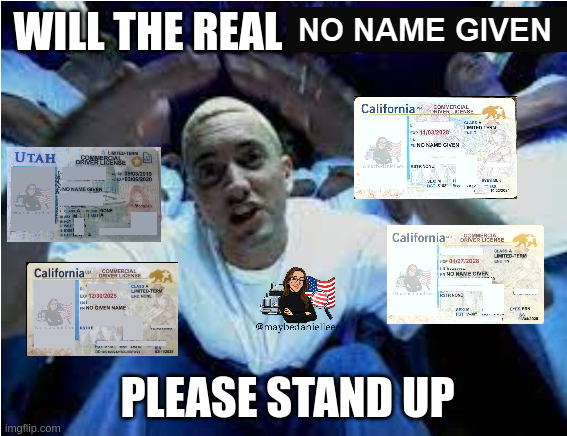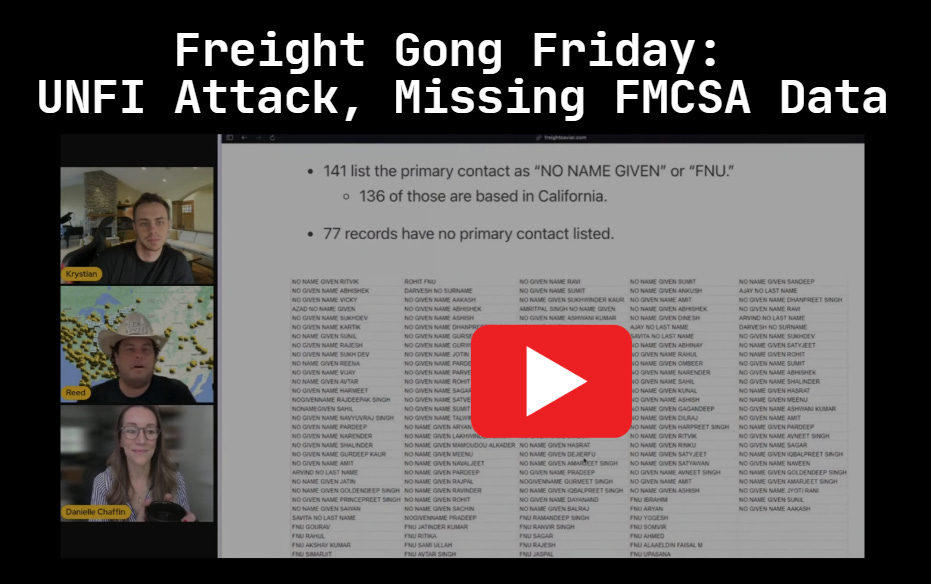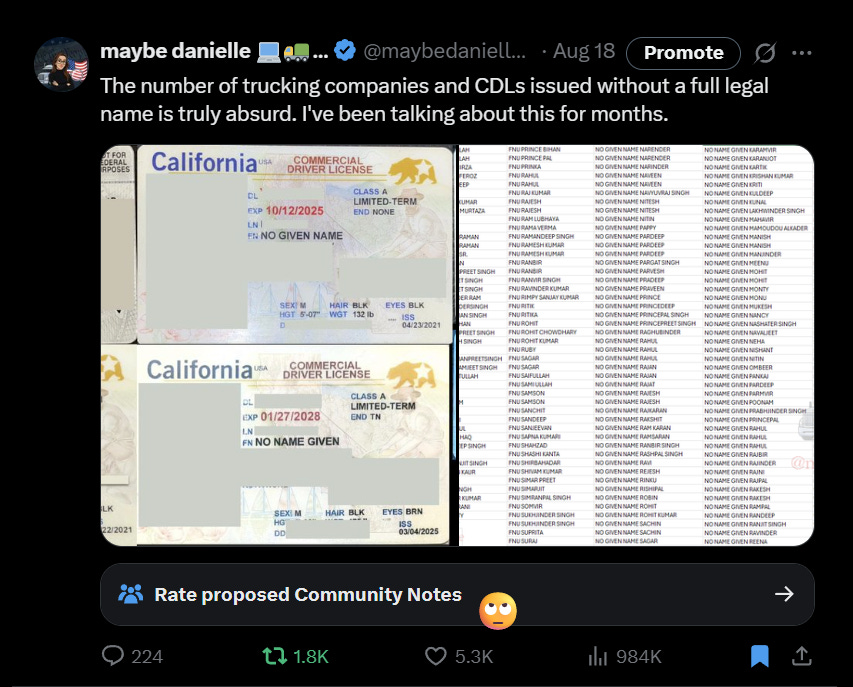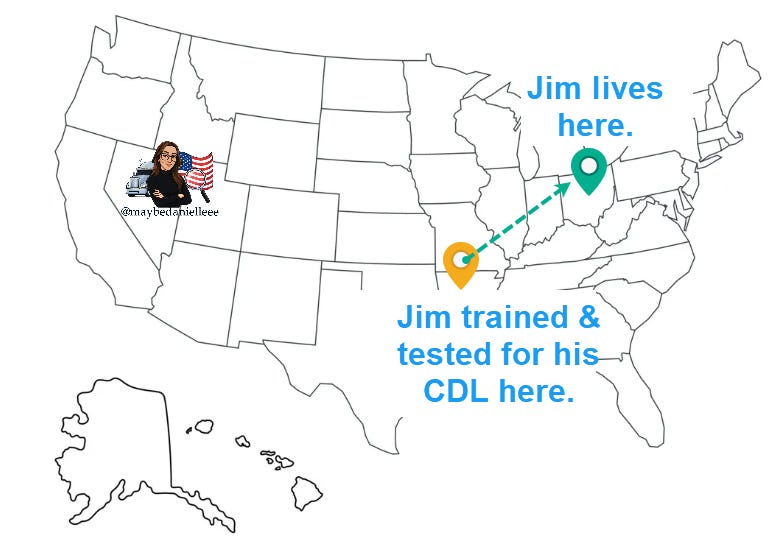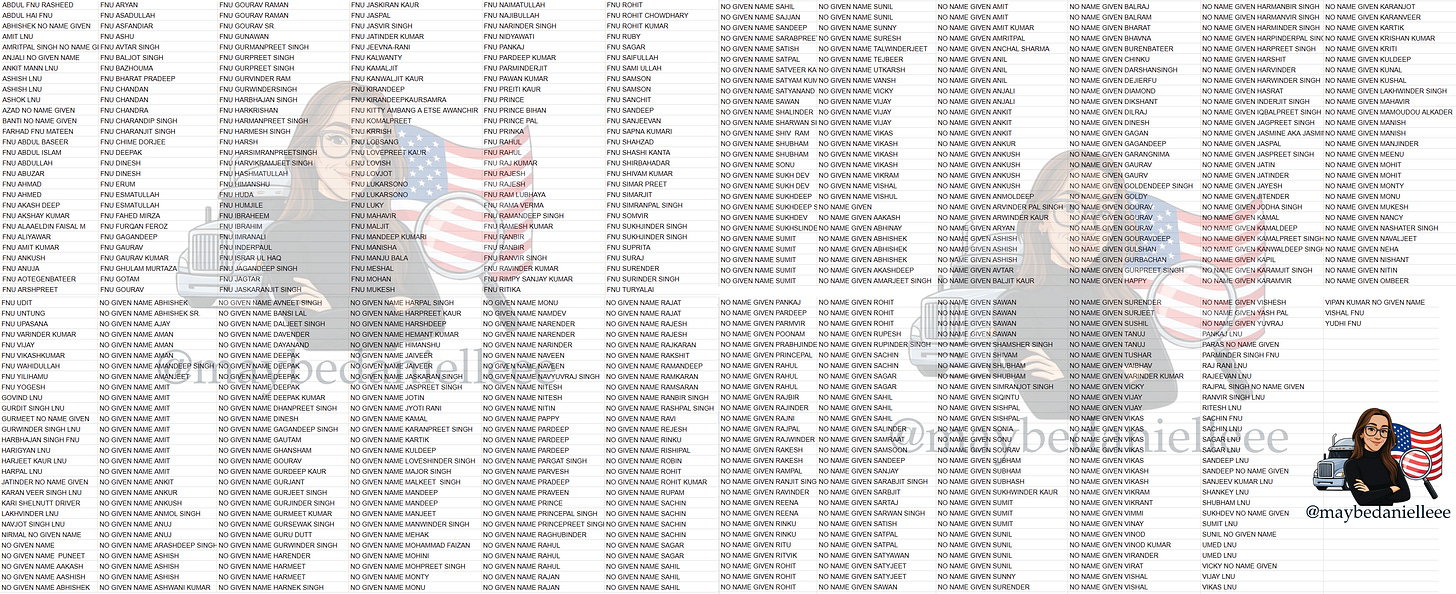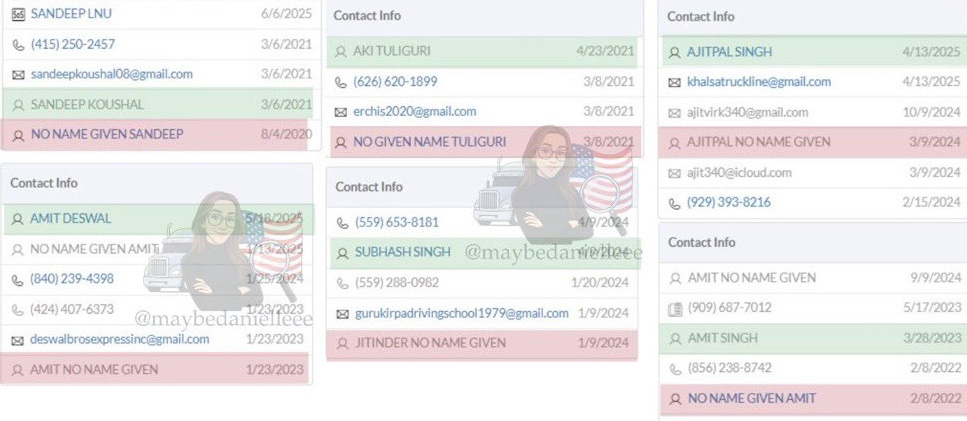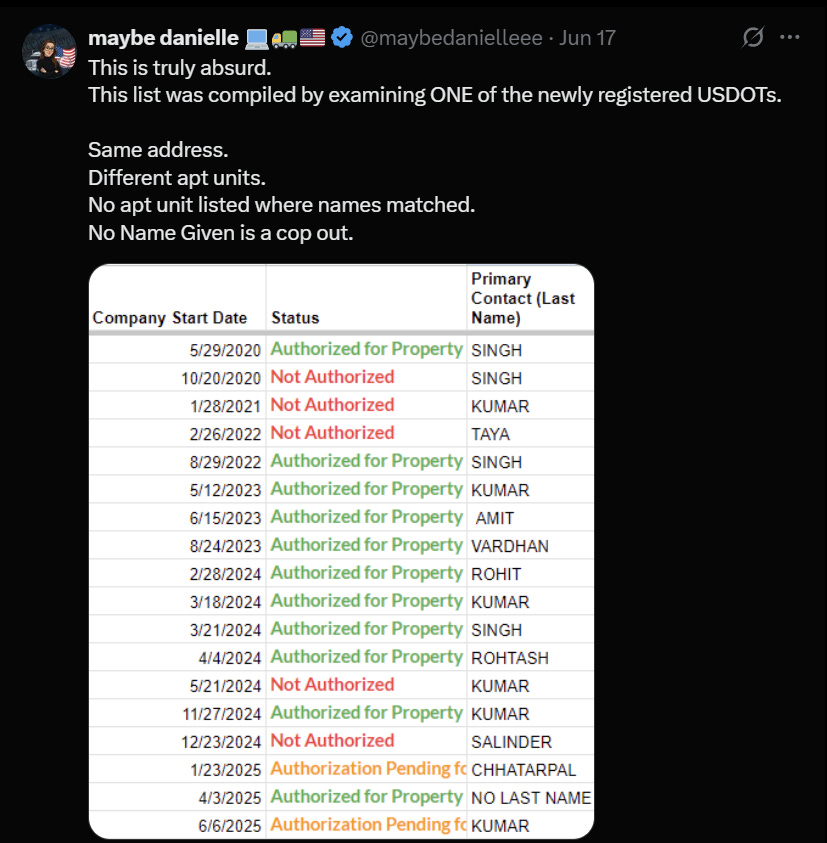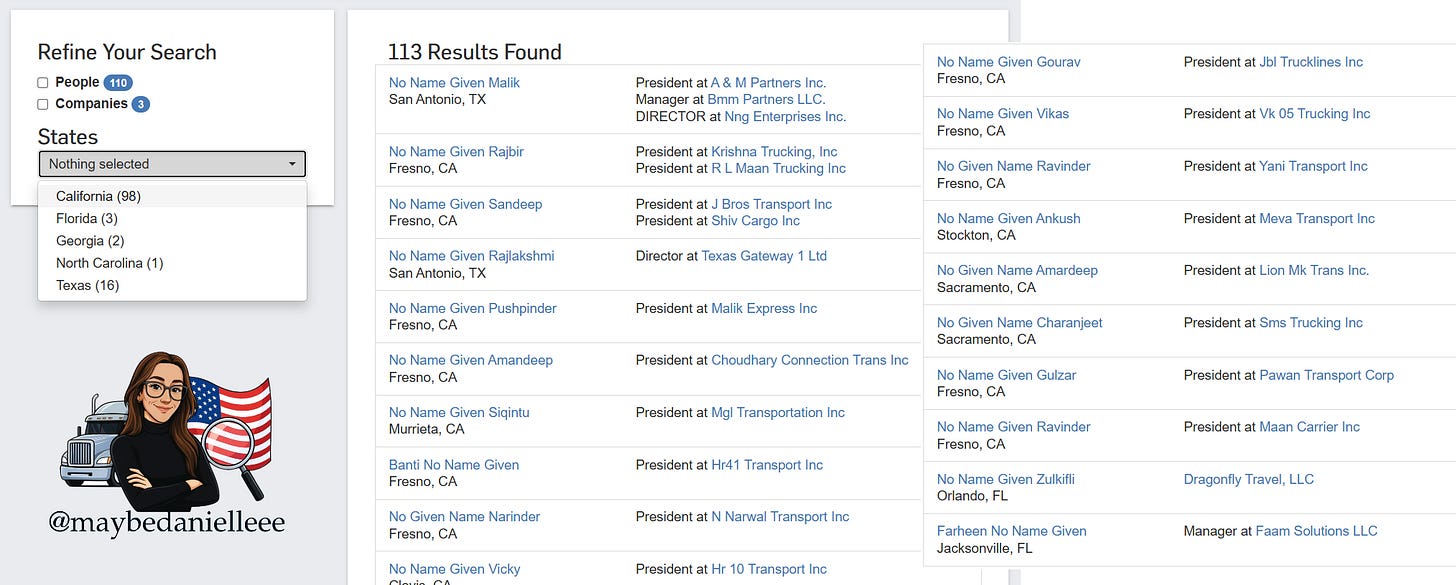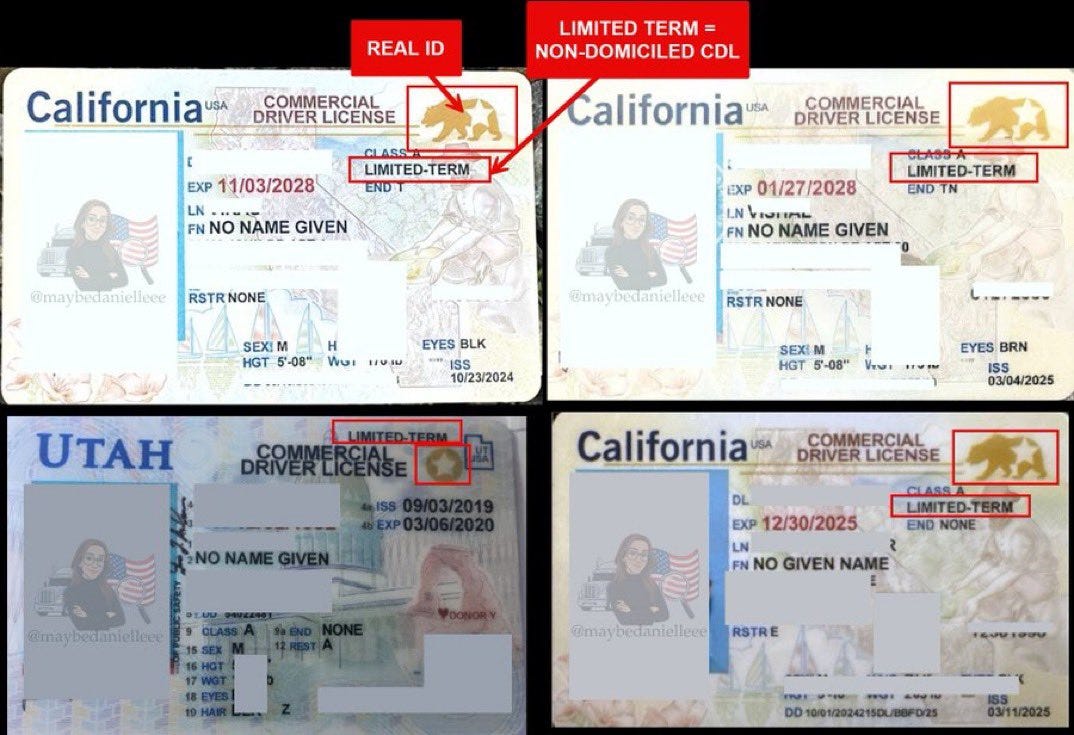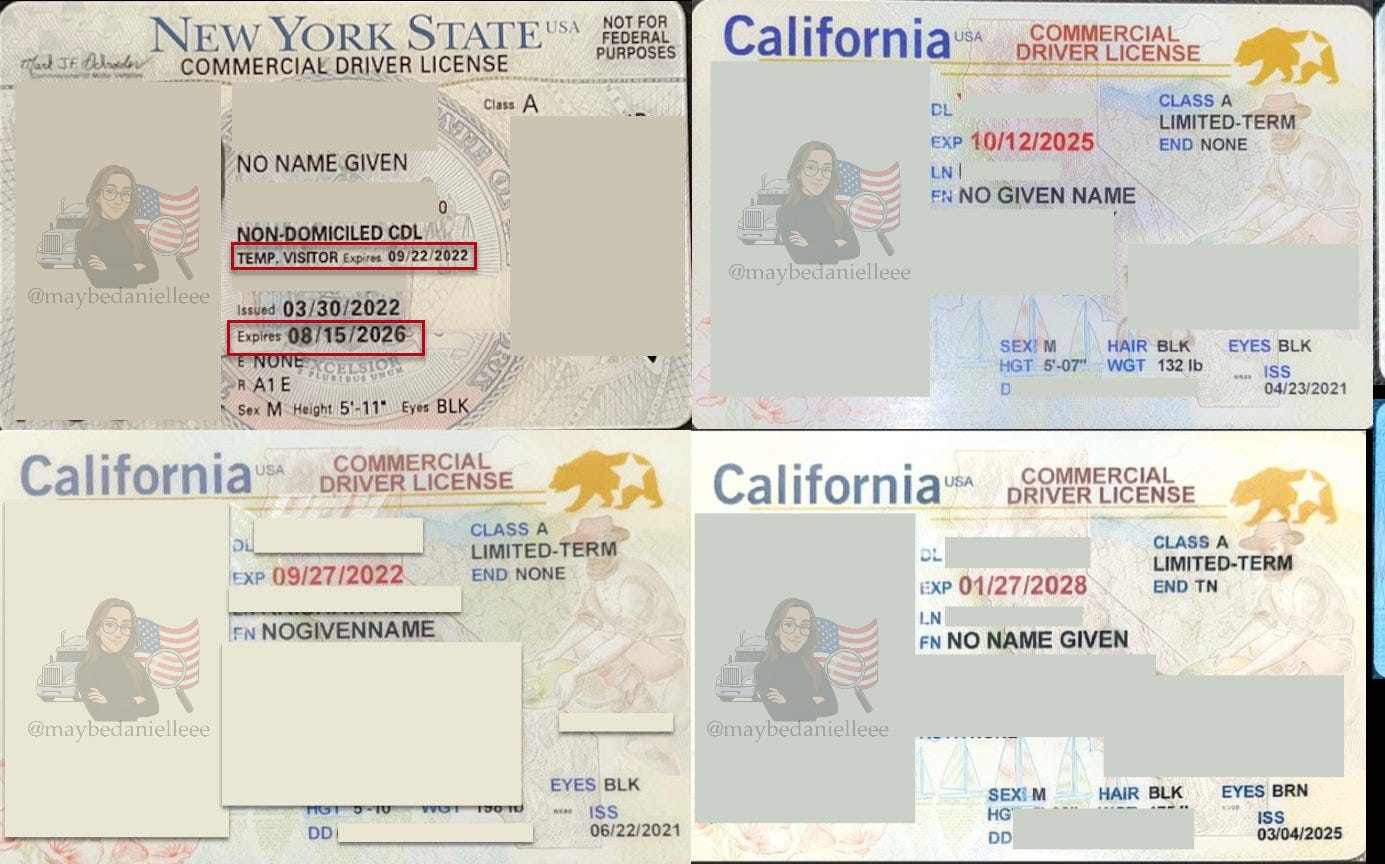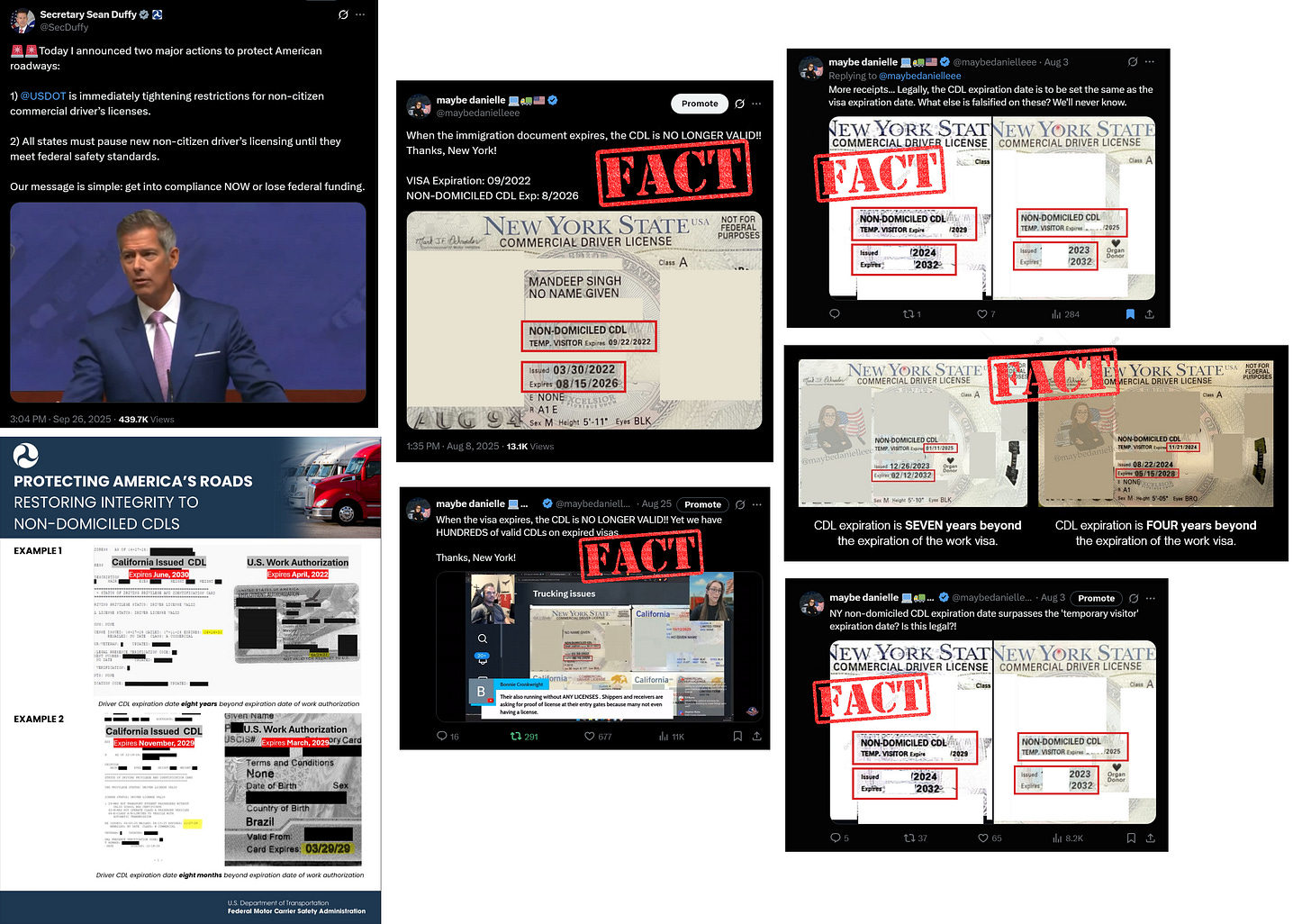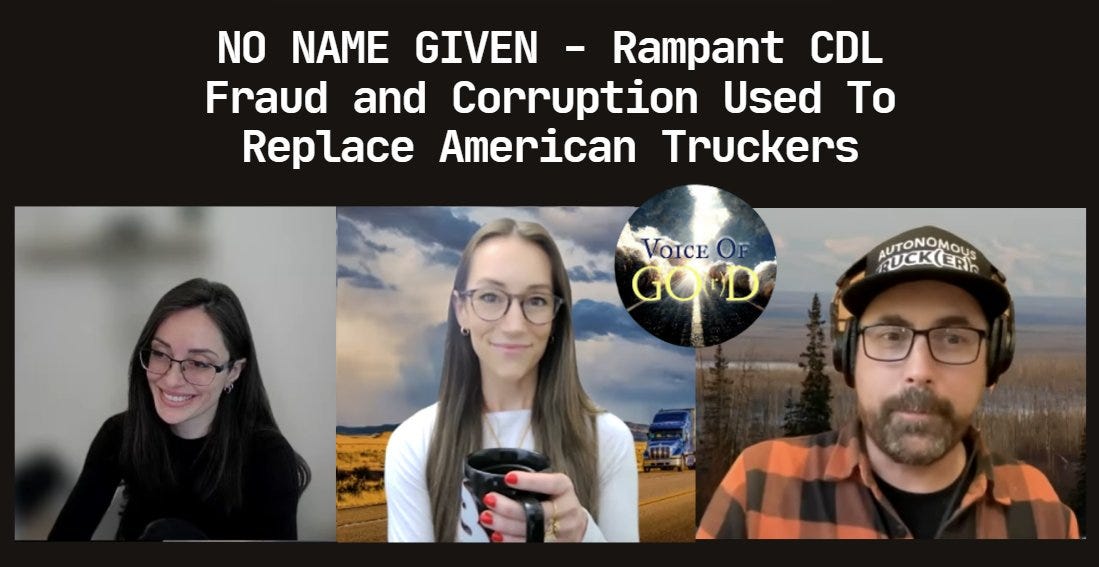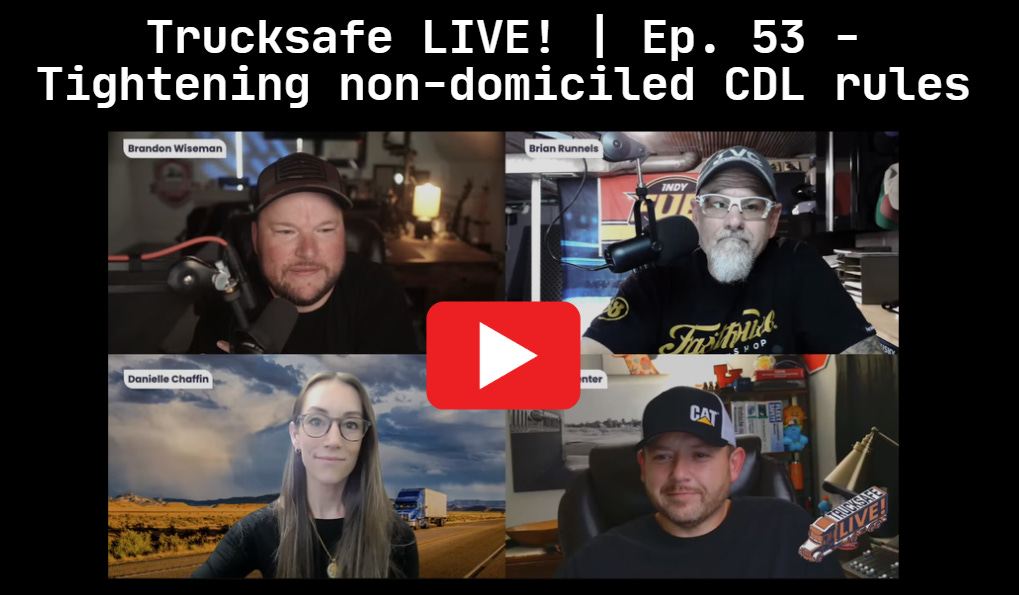Will the real 'No Given Name' please stand up?
‘No Name Given’ isn’t a harmless data error. It’s a symptom of a system that’s drifted far from its original purpose and has become a national security and safety risk.
In the freight industry, humor serves as a coping mechanism. A tool of survival, if you will. We make things funny that aren’t funny, because if we didn’t, we wouldn’t be ok. Nothing in this article is humorous, except this meme.
Back in June, I exposed the “No Name Given” issue in my FreightCaviar article “Eye-Opening Patterns in FMCSA Data,” where I documented troubling patterns in how trucking companies are registering with the USDOT using some variation of ‘No Name Given.’
Following this article, I joined the FreightCaviar team for Freight Gong Friday to discuss all the details (mess).
Following that exposure, I turned my attention to commercial driver’s licenses (CDLs) themselves to see if the same pattern was hiding there. Sure enough, it was. Since then, I’ve been documenting, in real-time on X, how this license category and the lack of a full legal name are being bent and abused.
Before diving headfirst into the “No Name Given” controversy, it’s essential that we define and understand precisely what a non-domiciled CDL is.
Non-Domiciled CDL.
A non-domiciled CDL is a commercial driver’s license issued by a U.S. state to an individual who is legally permitted to operate a truck in that state but is not considered a resident of that state.
Historically, a non-domiciled CDL was essentially a temporary license for individuals who trained and tested in one state but resided in another.
For example, Jim lives in Ohio but is hired by a trucking company in Arkansas. He goes through the company’s training school in Arkansas and takes his CDL skills test there. Arkansas, which cannot issue a full CDL to a non-resident, issues Jim a non-domiciled CDL instead. When Jim returns to Ohio, he applies for an Ohio CDL, and the Arkansas license is automatically voided. This system prevented a driver from holding two valid CDLs at once, while still allowing out-of-state training and testing.
Today, the non-domiciled CDL is most often issued to foreign nationals working under a work visa or another lawful status. Under FMCSA rules, a driver could qualify with a valid Employment Authorization Document (EAD) or a foreign passport accompanied by an I-94 arrival/departure record. Drivers from Canada and Mexico don’t need one because the U.S. recognizes their CDLs under reciprocity agreements.
Note: ‘Limited term’ and ‘non-domiciled’ are the same thing. Don’t let your state or governor confuse you!
What began as a policy with good intentions has, somewhere between intention and execution, fallen apart.
It is broken. The entire system is broken.
No Name Given Trucking Companies
It isn’t lovely. And to be frank, it’s pretty stupid.
According to USDOT / FMCSA registrations, this isn’t some long-standing data issue. It didn’t start 45 years ago, despite what some X users claim. It really only started showing up around 2022. From 2015 through 2021, I could only find 25 trucking companies registered with some variation of ‘No Name Given.’ From 2022 to now, that number has increased significantly. Since Jan.1, 2022, 623 trucking companies have registered under some variation of ‘No Name Given.’
‘No Name Given’ isn’t a clerical error or a typo. It’s a placeholder. How do I know? Because the same DOT records later get updated to a full legal name, sometimes just days or weeks after the DOT registration is approved.
Based on what I’ve seen, this appears to be a deliberate tactic to circumvent the system and avoid matching to a previously registered USDOT number. I won’t go into chameleon carrier behaviors here, but in my article, What the Heck Is a Chameleon Carrier?, I detail exactly why one person would register one or more “trucking companies.”
In CorporationWiki, 113 business owners are listed as “No Name Given.” Almost ALL of them are tied to trucking companies, and 98 of those are in California.
Why are we the only industry in America that allows this?
No Name Given CDLs + Real IDs
Some of the CDLs I’ve obtained in my private files do have a full legal name; it’s just not entered correctly. The first and last names are combined. On paper, the individual has a full legal name, but in the public records, it is not listed… Why? I don’t know.
Interestingly, as I reviewed the CDLs, I noticed that almost all of the non-domiciled and limited-term CDLs are issued with the REAL ID stamp. That should concern everyone.
On paper, getting a REAL ID license is supposed to be rigorous. You have to prove your identity, your lawful presence or citizenship/immigration status, your Social Security number (if applicable), and your residency in the state. Typically, these documents include your life story, a blood sample, a DNA strand, utility bills, lease agreements, a birth certificate, and other relevant documents.
The entire purpose of the REAL ID program is to reduce identity fraud and ensure that the person presenting the ID is genuinely who they claim to be and that they are legally allowed to be in the U.S. The REAL ID stamp is a credential designed for people who meet residency requirements… This, in itself, signals that something has gone off the rails.
Thankfully, we have an administration that hears us!
“It’s all true!” -Secretary Sean Duffy.
For months, I’ve been dismissed as an “alarmist,” and many people on social media have argued with me. Now the federal government itself is saying the same thing I’ve been saying! Last Friday, September 26, Secretary Sean Duffy publicly confirmed what I have been posting and suspected for the past eight months… IT’S ALL FRAUD AND THE REPORTS ARE ALL TRUE!
So true that Sec. Duffy declared it a national emergency requiring immediate action. That action came in the form of the Interim Final Ruling: Restoring Integrity to the Issuance of Non-Domiciled Commercial Drivers’ Licenses (CDL).
The final rule brings MUCH NEEDED reform:
Specific visas only. Non-citizens must now hold employment-based visas (H-2A, H-2B, E-2). A work permit or asylum status no longer qualifies.
Hard stop on expiration. Licenses must end when the visa ends, or after one year, whichever comes first.
Verification required. States must verify and confirm immigration status through the SAVE system.
In-person renewals and stricter documentation rules are now mandatory.
Mandatory downgrades: States are now required to downgrade a non-domiciled CLP or CDL as soon as they become aware that the holder is no longer eligible.
States like California have been given 30 days to audit and revoke invalid licenses, or risk losing millions in federal highway funding.
This isn’t just a trucking problem.
The industry and the public need to understand —> ‘No Name Given’ isn’t a harmless data error. It’s a symptom of a system that’s drifted far from its original purpose and has become a national security and safety risk.
It’s tempting to dismiss this as a “trucking only problem.” It’s not.
Everyone shares the road with commercial trucks. When oversight fails, the consequences aren’t abstract. They’re measured in fatalities, shattered families, and crashes that never should have happened.
For years, the driver shortage narrative has been used to justify lowering standards. “We need more drivers!” Rules were bent, verification was weakened, and the pipeline continued to flow. The cost of cheap labor, weak checks, and lax enforcement has finally come due.
The non-domiciled CDL loophole has been exploited long enough. That it took fatalities, investigative audits, and a looming public-safety crisis to force change should make all of us ask: What else is slipping through the cracks? *Spoiler: a lot.
Allowing someone to operate a heavy truck on U.S. roads without even a verified legal name undermines everything the CDL program was designed to ensure: one driver, one license, one verified identity.
This isn’t about vilifying immigrant drivers. It’s about closing loopholes that bad actors exploit to avoid accountability while driving an 80,000-pound machine next to or behind your family on the interstate.
//
And to all the naysayers, I told you so.
Update(s)
Gord (Autonomous Truck(er)s) invited me back to the Voice of Gord! I joined Miranda & Gord (of course) to discuss No Given Name CDLs, chameleon carriers, shady Eastern European trucking operations, and all the other chaos wreaking havoc in the industry.
If you care about safety, fraud, or the future of American trucking, this one’s worth a listen.
I had the honor of joining TruckSafe Consulting to dig into some of the most pressing issues we’re facing. Non-domiciled CDLs, the rise of “No Name Given” registrations, and most importantly, where we go from here.
Until next time.
—maybe danielle
If you found this post valuable and want to help me keep digging, consider making a one-time contribution. It’s like buying me a coffee, but your support funds PACER court records searches, document requests, data crunching, and reporting on issues no one else is covering.


